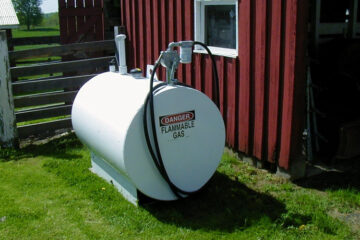
How to store gas at home (and does gas go bad?)
Between vehicles, generators, and other gas-powered equipment around your home, it makes sense to store at least a little bit of fuel in case an emergency strikes. This guide explains the ways people store gasoline and other FAQ.
A sudden evacuation, power loss, or SHTF event is not the time to wait in line with other panicked people at a gas station — if it's even open and supplied to begin with! You may need to bug out quickly or immediately run a generator for medical reasons, for example.
Review: Best gas can
Summary:
Our Pick
Sta-bil Fuel Stabilizer
Cheap and effective. Add this to your stored gas to keep it fresh for up to a year or more. 8 ounces of Sta-bil treats 20 gallons of gas.
Check local laws
Lame disclaimer time! Gas is dangerous. Which means it's regulated by the government and any discussion around it often includes tons of overly-cautious warnings.
Generally speaking, you don't need permission to store gas on your property. But there are various state, county, and city ordinances that may apply. HOAs and multi-unit buildings may also have their own rules, too.
Tip: A good resource is your local fire department. We've installed large systems in the past, and the local FD was great about giving tips on location, laws, and so on.
For example, one time when installing 1,000 gallons of above-ground tanks in an area prone to wildfires, the fire department told us the minimum distance they needed between the house and fuel tanks (essentially large bombs) to still feel safe while trying to save the home from fire.
Types of gas storage
Generally speaking, people tend to start at the top and work their way down: